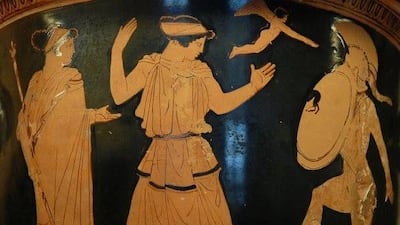Life of Pi author Yann Martel is "nearly finished" with his next book, Son of Nobody, a fragmentary novel inspired by Homer's The Iliad that offers an alternative perspective of the Trojan War.
"I'm days away from sending it to my agent, who'll then send it off to my editor. Of course, it still has to be edited but it is a very, very advanced draft," the Booker Prize-winning novelist teased during an online talk at the Sharjah International Book Fair.
Martel, 57, says the idea for the novel came to him when he picked up a copy of The Iliad.
The origins of 'Son of Nobody'
"I had read up on the war, mostly simplifications for children, and I knew lots about the Trojan War, but the actual work by Homer I had never read," Martel says of the ancient Greek poem, which is set in the final year of a decade-long siege of the city of Troy by an alliance of Greek states. The events in Homer's work span only a few weeks – narrating key battles as well as the strife that existed between King Agamemnon and one of his most prized warriors, Achilles – yet alludes to several Greek legends about the siege.
“Luckily I picked up a good translation,” Martel says, emphasising how important interpretation of the piece is, even though translating Homer, he says, has “been an intellectual sport for centuries".
The translation that Martel read is by US scholar Stephen Mitchell. It was as gripping a read as a Game of Thrones book, he says. "I thought it'd be clunky and heavy-going. It wasn't at all. It's thrilling. It is a pulsing epic.

"When the Greeks relearnt how to write around the 8th century BC, the first book they wrote down – because they didn't want to forget it – was this oral tale called The Iliad. So it is literally the very first book in the West."
Even after Martel had read the book, he couldn't stop thinking about it. Something about the work stayed with him. So he read it again.
“Homer’s muse was talking to me, too. So I kept looking at it and certain observations came out.”

One that struck him was that in the entire 560-page poem, across all the great, long speeches delivered by kings, princes and nobles, there is only one instance when a commoner, Thersites, a soldier in the Greek army, speaks.
"And what Thersites does is criticise Agamemnon. He says, 'Why are we in this war? It's been 10 years. There's nothing in us for it. I want to get out of here,'" Martel says, noting how Thersites is promptly beaten for questioning the system.
“I found it interesting. This war, going on for 10 years with thousands of soldiers, and only one commoner speaks. What’s that about?”
Martel's Son of Nobody, features a commoner like Thersites. The novel is about a scholar who unexpectedly gets a fellowship to the University of Oxford and while there, he browses through old texts and discovers new, previously ignored, aspects of the Trojan War. He then begins to reconstruct the time period and offer an alternative perspective of the epic war.
The novel’s pages, Martel says, will be divided in half, with the top part “having these lost fragments” written in a way that alludes to Homer’s dactylic hexameter, as well as the styles of ancient Greek works, whereas the bottom half will be the scholar’s commentary.
Martel likens the novel's style to Vladimir Nabokov's Pale Fire, saying "it will be a novel told in fragments, in verse and in footnotes. But, of course, there's a lot happening in the footnotes because there's the parallel story of the scholar."
What else is Yann Martel working on?
Martel says he's been working on the novel for the past four years, starting soon after his last book, The High Mountains of Portugal, was published in 2016. Martel says he isn't a writer who can work on many things at once and, instead, likes to take his time, going from "one avenue of ideas to the next. I live with my book, research it, keep going back and forth as research throws up new ideas."
Though he isn't much of an outliner, he does plan his novels before setting out to write them.
“When I write the first sentence, I already know what the last sentence will be. But I am still surprised. Writing is like travelling. You may have your plans, your backpack and guidebooks, but it is still an adventure that can turn out differently.”
Although he likes to keep his focus on one specific project at a time, Martel says a number of other ideas are currently vying for his attention.
“One is about a teenage centaur that plays the electric guitar and loves Elvis Presley songs. I still do not know what to do with it, but it could be the premise for an East meets West meditation,” he says. “I also bought the sea log maintained by Christopher Columbus during his travels at a sale some years back. The idea of a ruthless and ambitious man with no inkling about the consequences of his travels also fascinates me. Let us see where it goes.”


